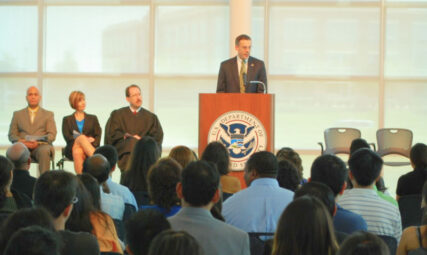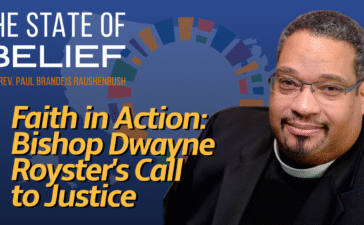(RNS) — When Paul Hunker approached Dallas Bishop Edward Burns to introduce himself at the bishop’s 2017 installation Mass, he did so almost “sheepishly.” Hunker, then the lead counsel for U.S. Immigration and Customs Enforcement in Dallas, worried Burns might give him “a hard time.”
Just a few weeks after President Donald Trump took office and instituted a travel ban on several predominantly Muslim countries, the installation Mass came at one of the few times in 31 years of working for the agency that he felt “ashamed to be working for ICE,” Hunker, a longtime member of the Catholic group Opus Dei, told RNS.
Hunker retired from ICE in early 2024 and soon after joined a private immigration law practice. Now, as the second Trump administration doubles down on a strict immigration policy, Hunker has often found himself on the opposing side of his former employer. He has criticized Trump’s attack on birthright citizenship and raised concerns that Mahmoud Khalil’s detention infringed on First Amendment rights. He has appeared on conservative-leaning Catholic television network EWTN and on CBS Texas to share his views and explain immigration policy.
He typically doesn’t talk about his membership in Opus Dei, seeing public announcements about it as at odds with his lay identity, but on an EWTN appearance, Hunker said Catholic teaching on the importance of family ties had influenced his work at ICE, as he used prosecutorial discretion to avoid deporting the family members of U.S. citizens.
Hunker joined Opus Dei, Latin for “the work of God,” in 1988 as a student at Marquette University, a Jesuit institution. He devoted his life to the primarily lay Catholic group, finding resonance in its emphasis on achieving holiness through ordinary work done well and in the teachings of the founder, St. Josemaría Escrivá, about “living one’s faith in the world.” Before that, he said, his relationship to Catholicism had been intellectual, but in Opus Dei he learned to practice the faith “well.”
“ We’re trying to serve and love other people and do my work well and do it as an offering,” Hunker said.
Opus Dei is well-known for its connections to highly placed prelates and conservative politicians and recently infamous for allegations of human trafficking. It has also been accused of propping up Spanish dictator Francisco Franco and influencing President Donald Trump’s policies through support for Project 2025.
But Hunker has pushed back against Trump on immigration, including in spaces like the Napa Institute’s summer conference last year, which has historically promoted a combative Catholic conservatism and whose founder, Tim Busch, considers himself a “cooperator” of Opus Dei.
Hunker co-led the session on Catholic social doctrine and immigration with Burns, who at his installation in 2017 told Hunker he supported his work at ICE.
Hunker’s message for that audience was peppered with citations of the Catholic catechism, Pope Francis and church documents. “The obligation of a prosperous nation to welcome foreigners is an example of the universal destination of goods. Just as a wealthy person in justice should share his goods with the needy, a prosperous nation should welcome those in need,” he told Napa attendees.

Paul Hunker presents “The Catholic Social Doctrine and Immigration” at the Napa Institute’s 2024 Summer Conference. Video Screengrab
Hunker told Napa attendees about a 21-year-old Vietnamese lawful permanent resident who had gotten in some legal trouble and ended up in immigration detention. The young man’s lawyer had already asked Hunker to dismiss the case, but when Hunker happened to run into the young man while facilitating Burns’ visit to the detention center, he felt “there are no coincidences,” citing St. John Paul II, and dismissed the case.
To Cecilia González-Andrieu, president of the Academy of Catholic Hispanic Theologians of the United States, Hunker’s public appearances look like a conversion arc. “ It’s a story about how transformative the theology of encounter can be,” she said, referencing a theological principle about forming relationships.
“ I would never have wanted anyone to be part of the ICE system, but since he was, okay, so now he has the opportunity to really make reparations,” said González-Andrieu, a theology professor at Loyola Marymount University.
But conversion isn’t how Hunker tells it. He doesn’t disavow his time with ICE — instead framing his move into private practice as a new challenge that made sense because he was eligible for retirement.
Hunker is also quick to criticize the Biden administration, telling RNS the previous administration’s 100-day moratorium on deportations was “crazy” and “imprudent.” He also said Biden’s expansion of parole programs, which gave temporary permission and work permits to new arrivals from certain countries, played into the resentment that helped re-elect Trump, as even other immigrants felt new arrivals were getting special privileges.
Hunker says he “has great affection for the agents,” saying ICE employees in Dallas worked to reunify families and that, when they aren’t constrained by the kind of inflexible guidelines currently in place, “we go after the bad guys.”
“The agents I know, they respect people’s rights. They’re trying to follow the law,” he said, adding, “ obviously if some ICE agent misbehaves or violates someone’s rights, they should be subject to discipline.”
Polling shows support for ICE has plummeted as videos of violent detentions and masked agents go viral. Almost 4 in 10 (38%) registered voters support abolishing the agency, according to a recent Civiqs poll.
Other Catholic immigration advocates also voice skepticism of the agency. Don Kerwin, vice president of advocacy, research and partnerships for Jesuit Refugee Service/USA, said ICE is “pushing the rule of law at this point.”
González-Andrieu said ICE, in tearing families apart, is an example of the banality of evil, which is not excused by simply following orders. “ We can’t say that, well, they’re good guys, but they’re doing evil things,” she said. “ What we are taught is you have to stop doing evil things and you have to be contrite about doing evil things.”
Still, both advocates said Hunker’s background puts him in a position to communicate and serve in a way they cannot.
Hunker is now on the Dallas diocese’s immigration task force as he and Burns work to reassure skittish immigrant Catholics that it’s safe to go to Mass.
“ The Trump administration is much more aggressive, but there can be undue fear out there,” Hunker told RNS. “There’s some risk, but maybe it’s more likely you’ll be struck by lightning than be arrested by ICE driving to church.”
The attorney is trying to help Catholics have less fear and make “more rational decisions,” like taking public transit instead of driving without a license, which could lead to an arrest and then ICE detention.
Kerwin does not share Hunker’s assessment of irrational fear.
“ I think that the people that are making those decisions are in the best position to know what the risk is,” said Kerwin. He said that, while risk can occasionally be “exaggerated,” the recent massive increase in ICE funding in the latest budget points to many more immigrants without criminal records being swept up in detention or deportation.
Hunker told RNS he was also concerned about the budget increase, explaining he worried the funding is “going to lead to a lot of people who aren’t criminals or dangers to society being arrested by ICE.”
Tim McManus, a senior organizer at Dallas Area Interfaith, an affiliate of the Industrial Areas Foundation, said Hunker had been a “key ally,” as organizers have tried to sort through new Trump administration policies, like a recent policy preventing migrants from leaving detention on bond while challenging their deportation.
Hunker “ is just very clearheaded in his ability to project out what he thinks ICE counsel would argue,” McManus said. Hunker’s judgement “has been really helpful as we’ve developed a legal representation strategy for people in detention.”
While Hunker says his values and faith haven’t changed since he worked for ICE, crossing to the other side of immigration court has still been transformative for him.
Before, he said he didn’t fully appreciate how “life-changing” his routine decisions about a stay of removal or green card could be.
Now, knowing his clients and their families, “it’s spectacular” when he can get them that relief.
But he’s also seeing life get harder for his non-citizen clients. Every day, attorneys like him are asking, “ What new horror comes down from the administration?” Hunker said.







